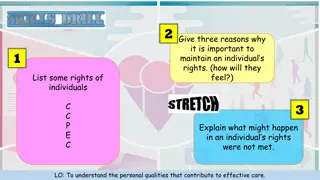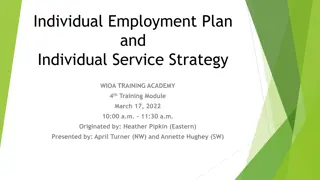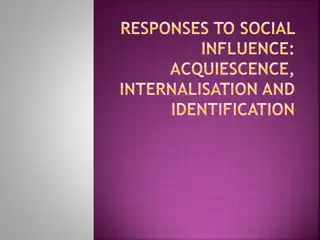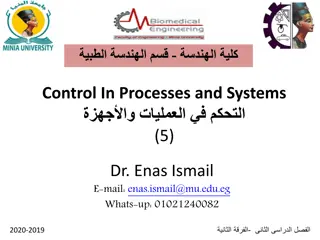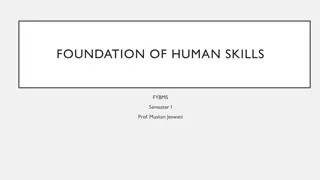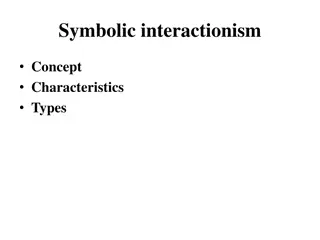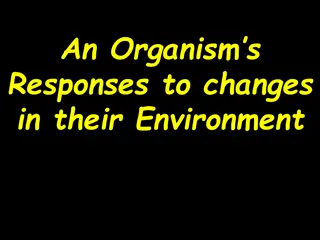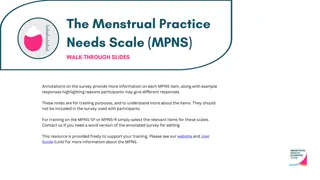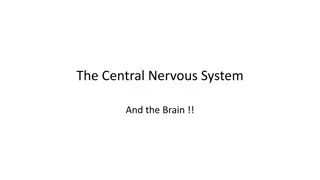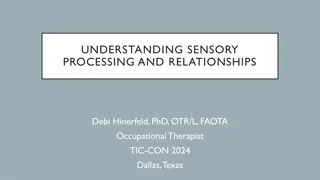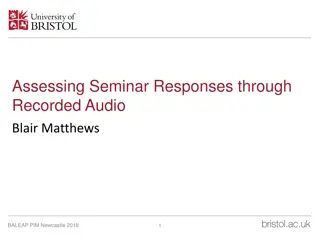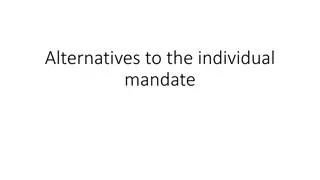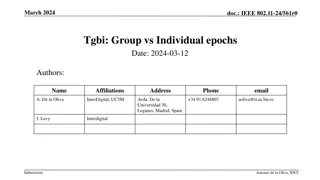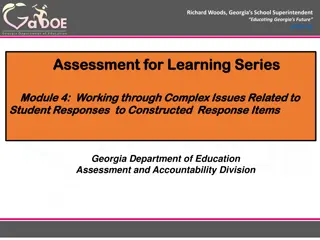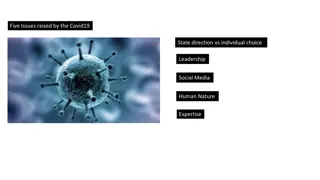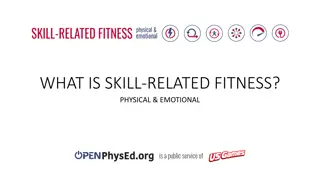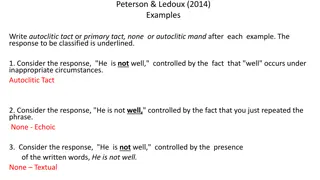Breathe 1-Month Survey 2021-2023 Head Start Responses Analysis
This report analyzes responses from the Breathe 1-Month Survey 2021-2023 in the Head Start program. It covers the roles of participants, frequency of material usage, usefulness of materials in tobacco education, and future likelihood of material use. Insights into the engagement and perceptions of t
0 views • 5 slides
Federal Learning Account Program: Enhancing Individual Training Rights
Explore the Federal Learning Account Program focusing on individual training rights, including the right to an individual training plan, sectors with collective bargaining agreements on education, and employer responsibilities in providing training opportunities. Discover practical tips for particip
2 views • 34 slides
Thematic Working Group for Libya Flood Responses - Updates and Coordination Efforts
Thematic Working Group for Libya Flood Responses held a meeting on 17 October 2023 to discuss coordinated responses, targeting needs and damage assessments. Updates and documents published by partners after 10 October 2023 were shared, including reports from SRSG Abdoulaye Bathily and various agenci
0 views • 10 slides
Importance of Maintaining Individual Rights in Effective Care
Recognizing and upholding an individual's rights is crucial for providing effective care. It ensures the individual feels respected, valued, and supported, contributing to a trusting relationship. Failure to meet these rights can lead to negative consequences impacting the individual's well-being an
0 views • 32 slides
Individual Employment Plan (IEP) and Individual Service Strategy (ISS) in WIOA Training Academy
Individual Employment Plan (IEP) and Individual Service Strategy (ISS) are essential components of the WIOA Training Academy, tailored to meet the career needs of participants under various WIOA programs. IEPs focus on personalized career services for adults and dislocated workers, while ISSs are sp
2 views • 23 slides
Spectatorship in Film Studies
Explore the active role of spectators in creating meaning and emotional responses in films. Discover how filmmakers manipulate viewers and how audience expectations, spectator positions, and cultural factors shape various responses to films. Dive into the concepts of active and passive spectatorship
0 views • 18 slides
Overview of Performance Management Systems and Competency Mapping
Performance Management Systems (PMS) play a crucial role in ensuring organizational objectives are met through individual contributions. This entails continuous improvement at all levels - individual, team, and organizational. Managing performance is vital for survival and growth in a competitive en
5 views • 45 slides
Influences of Individual Characteristics on Health: A Critical Exploration
This session delves into the various influences on health at an individual level, examining factors such as developmental, social, and psychological elements. It explores the impact of foetal development, teratology, and foetal programming on long-term health outcomes, emphasizing the intricate rela
0 views • 20 slides
Discovery Motions in Civil Pretrial Practice
In civil pretrial practice, discovery motions play a crucial role when the opposing party fails to respond adequately to formal discovery requests. These motions include Motion to Compel, Motion to Compel Further, and Motion to Deem Facts Admitted. By filing these motions, parties can seek court ord
0 views • 17 slides
Insights from WJEC A Level English Literature Examiners' Report
Examiners noted candidates' strengths and weaknesses in analyzing poetry pre-1900 and unseen poetry. Candidates lacked confidence in discussing form and contextual influences, but some effectively integrated these aspects. Responses to individual poems were detailed, with contextual focus crucial in
3 views • 18 slides
Responses to Social Influence in Psychological Context
Social influence plays a significant role in shaping human behavior, with responses such as acquiescence, internalization, and identification affecting individual conformity to group norms. Conformity reflects matching attitudes, beliefs, and behaviors to group standards, which may lead to groupthin
0 views • 16 slides
Human Behavior: Foundations and Factors
Human behavior is a multifaceted subject influenced by genetic makeup, culture, and individual values. It encompasses both overt actions and covert thoughts, a product of the individual and environmental factors. Psychologists study behavior from visible (overt) actions like playing football to inne
0 views • 20 slides
Time Domain Dynamic Responses in Control Systems
In the field of control systems, analyzing time domain dynamic responses is essential for evaluating system performance. This involves studying transient and steady-state responses, as well as characteristics such as steady-state error. By examining these responses to standard input signals, insight
4 views • 30 slides
Human Nature and Individual Differences in Foundation of Human Skills
Explore the foundational concepts of human behavior, individual differences, and organizational culture in the study of human skills. Delve into topics such as human nature, personality, attitudes, intelligence, and learning in Prof. Muskan Jeswani's course. Understand the significance of inter- and
0 views • 11 slides
Symbolic Interactionism in Sociology
Symbolic Interactionism is a school of thought in sociology that focuses on how individuals interact with each other through symbols, shaping social structures. It highlights the role of symbols in defining actions and meanings in social interactions. The concept explores how different socializing e
0 views • 18 slides
Chemistry through Open-Ended Questions
The content provides a detailed assessment of student responses to open-ended chemistry questions related to hydrogen peroxide and its applications in teeth whitening gels. Various student answers are analyzed based on their understanding of the chemistry concepts involved, with explanations given f
1 views • 18 slides
Organisms' Responses to Environmental Changes
Organisms demonstrate responses to changes in their environment through stimuli and reactions. These responses can be internal or external, leading to behaviors such as seeking food, avoiding danger, or adjusting growth patterns. Examples include animals seeking food when hungry or plants growing to
3 views • 15 slides
Enhancing Understanding of MPNS Items Through Annotations and Example Responses
Gain deeper insights into each MPNS item through detailed annotations and example responses, shedding light on potential reasons for varied participant responses. These resources are ideal for training purposes to improve comprehension of the MPNS-SF and MPNS-R scales. Contact us for editable versio
0 views • 37 slides
Methods to Evaluate Benefit-Risk Trade-Off in Individual Patients
Evaluating benefit-risk trade-offs in individual patients is crucial for making informed treatment decisions, especially when safety concerns arise with new therapies. This involves developing statistical algorithms to identify cases where potential harm outweighs benefits, as illustrated in the TRA
0 views • 26 slides
The Central Nervous System and Brain
The central nervous system plays a crucial role in enabling organisms to respond to stimuli and adapt to changes in the environment. Comprising receptors, neurones, and effectors, this system facilitates the detection of stimuli, transmission of messages, and appropriate responses. Neurones, includi
0 views • 18 slides
Understanding Sensory Processing and Relationships: Exploring Individual Differences
Explore the intricate connections between sensory processing and behavioral responses, delving into how individual variations in sensory patterns can impact relationships, engagement, and daily routines. Gain insights into the significance of sensory experiences in nurturing brain function, and lear
0 views • 29 slides
Seminar Responses Assessment Method Using Recorded Audio
Seminar responses are challenging to assess due to group dynamics. A novel approach involves students watching seminar excerpts and recording responses as if present. The method is practical and aids in assessing language skills effectively. This study delves into the practicability and language ass
0 views • 17 slides
Advanced Techniques in Relational Data Outlier Detection
This document delves into cutting-edge methods for outlier detection in relational data, focusing on profile-based and model-based approaches such as leveraging Bayesian networks, feature generation, and individual feature vector summarization. The examples provided showcase the application of these
1 views • 30 slides
Debating Alternatives to the Individual Mandate in Healthcare Reform
Recent bipartisan discussions have called for exploring alternatives to the individual mandate in healthcare, citing its unpopularity and criticisms of being coercive or ineffective. The industry supports the mandate but believes it should be better enforced. Studies suggest that eliminating the man
0 views • 16 slides
Analyzing Inequality Trends Using NTA at Individual Level
NTA (National Transfer Accounts) methodology is utilized to measure levels and trends in inequality at the individual level by adjusting age profiles and estimating adjustment factors. By studying distributions of individual outcomes and exploring factors contributing to inequality, questions like t
0 views • 44 slides
Strategies for Working with Traumatized Youth and Families
Addressing the challenges of working with traumatized youth and families involves acknowledging individual responses to trauma, understanding the complexities of predicting reactions, and employing specific strategies such as building trust, listening attentively, emphasizing positives, and promotin
0 views • 8 slides
Effect of Efgartigimod on Humoral Vaccine Responses in Patients with Autoimmune Diseases
The study explores the impact of Efgartigimod, a Neonatal Fc Receptor blocker, on humoral vaccine responses in patients with autoimmune diseases. It discusses how immunosuppressive therapies used in autoimmune disorders may affect susceptibility to infections and impair vaccine immunogenicity, highl
0 views • 18 slides
Emergency Medical Services System Collaborative Meeting Highlights
Highlights from the Emergency Medical Services System Collaborative Meeting on April 5, 2018, including introductions, ReddiNet bed availability for MCI response, monthly notices and responses, year-to-date alerts and responses, patient distribution, bed availability reporting for February and March
0 views • 66 slides
Item-Response Theory (IRT) in Educational Assessments
This lecture covers the design and use of test scores, focusing on the principles of Item-Response Theory (IRT) in large-scale international assessments. IRT aims to measure latent traits reliably by analyzing individual question responses rather than just total scores. The advantages of IRT over Cl
0 views • 53 slides
Discussion on IEEE 802.11 Group vs. Individual Epochs
Trigger discussion on differences between group and individual epochs in IEEE 802.11 standards. Group epochs involve simultaneous transitions of MAC parameters by all or selected STAs based on AP trigger, while individual epochs allow each STA to independently change its parameters. Key points inclu
0 views • 4 slides
Constructed Response Items in Education
Exploring the concept of constructed response items in education, this content delves into the complexities of student responses, assessment for learning, rubric development, and differentiation strategies. Richard Woods, Georgia's School Superintendent, provides insights on how to navigate through
0 views • 31 slides
Gandhian Model of Sustainable Individual Behavior in the Globalized World
The Gandhian model of sustainable individual behavior, as advocated by Prof. Vidya Jain, emphasizes nonviolence, peace, and harmony in a world plagued by globalization, conflicts, and intolerance. Drawing on Gandhi's principles from Hind Swaraj, the paper explores how fostering nonviolent societies
0 views • 30 slides
Member Country Responses to Policy Questions on Export Credit Agencies
The document explores responses from various member countries regarding their use of Eximbank/Export Credit Agencies, plans for expanding business scope, cooperation with other institutions, and challenges faced by their respective agencies. Countries like Turkey, Oman, Indonesia, and more share ins
0 views • 18 slides
GC EARB Enterprise Architecture Review Board Follow-up Presentation
Government of Canada's Enterprise Architecture Review Board (GC EARB) is conducting a follow-up presentation to address the conditions set forth in their previous review. The presentation aims to fulfill the conditional approval of a specific initiative by providing detailed responses to the require
0 views • 4 slides
Critical Issues in the Context of COVID-19 Crisis
The COVID-19 crisis has brought forward significant challenges related to state directives vs. individual choices, leadership styles, the impact of social media, human behavior and nature, and the debate on government bailouts. These critical topics explore the balance between governmental control a
0 views • 6 slides
Efficiency Tradeoff Between Class Adjudication and Individual Arbitration
Efficiency tradeoff between class adjudication and individual arbitration analyzes the enforcement of individual arbitration over class actions in the United States, highlighting the defense bar's advocacy for class action waivers and arbitration of individual claims. The Federal Arbitration Act's i
0 views • 9 slides
Skill-Related Fitness: Physical and Emotional Aspects
Skill-related fitness encompasses both physical and emotional components, such as agility, balance, coordination, power, reaction time, and speed. Physical agility involves quick body movements, while emotional agility relates to positive responses in various situations. Physical balance requires we
0 views • 7 slides
Immunology
Immunology is a crucial scientific field that examines our immunity against foreign invaders like viruses, bacteria, and more. It delves into our immune responses against various threats, including autoimmunity and tumor immunity. This discipline also focuses on the development, functions, and dysfu
0 views • 16 slides
Analysis of Autoclitic Tact Responses
Examples of autoclitic tact responses in behavior analysis, distinguishing between autoclitic tact, primary tact, none, and autoclitic mand. Understand the controlling variables and relationships influencing the responses. Gain insights into the nuances of verbal behavior classifications.
0 views • 4 slides
Mastering Open-Ended Responses for STAAR English EOC
Enhance your skills in answering Open-Ended Responses (OER) with STAAR English I EOC through insightful examples and a step-by-step approach. Learn to analyze questions effectively, provide clear answers, support them with evidence, and explain the textual connections. Sharpen your understanding of
0 views • 13 slides



